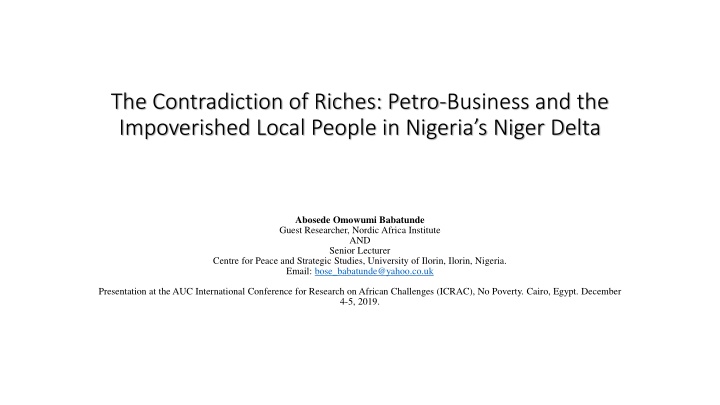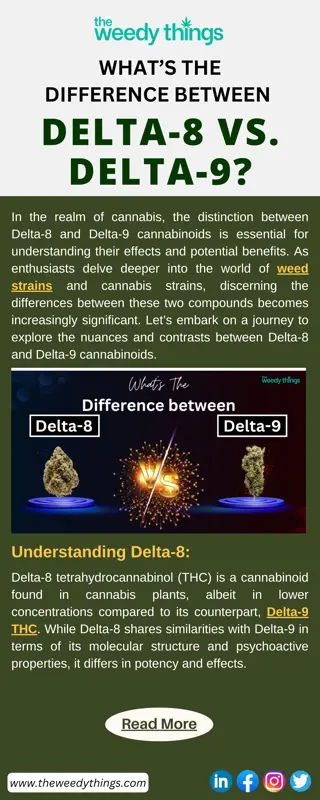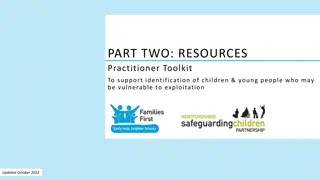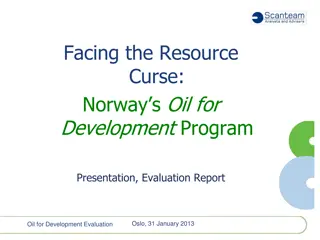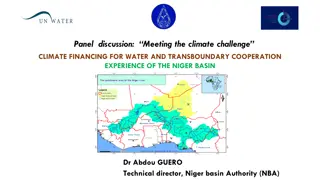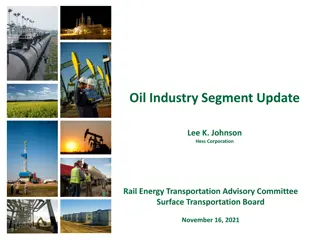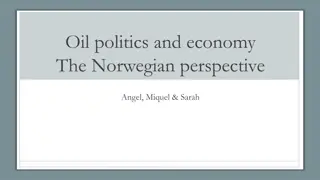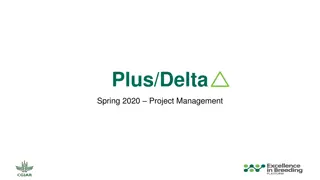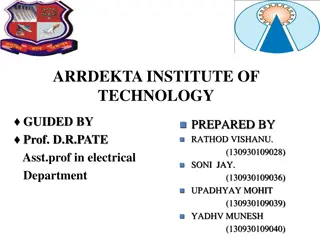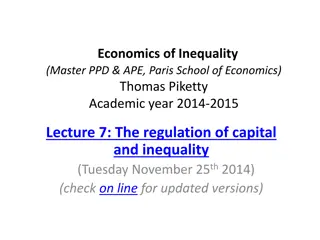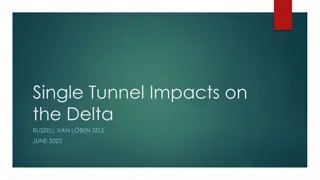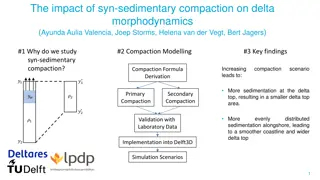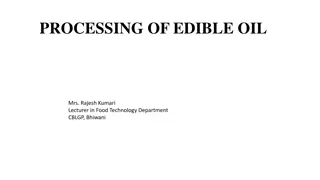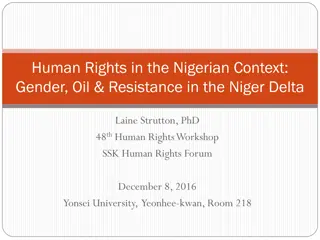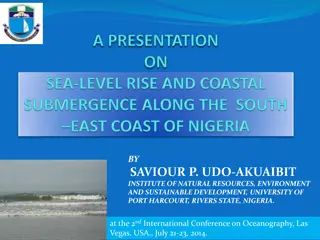The Curse of Wealth: Oil Exploitation in Nigeria's Niger Delta
Explores how oil politics exacerbate inequalities, poverty, and conflicts in the Niger Delta region. Discusses local contestations for oil benefits leading to a vicious cycle of poverty. Highlights the erosion of struggles for resource control and impacts on environmental justice and peace efforts.
Download Presentation

Please find below an Image/Link to download the presentation.
The content on the website is provided AS IS for your information and personal use only. It may not be sold, licensed, or shared on other websites without obtaining consent from the author.If you encounter any issues during the download, it is possible that the publisher has removed the file from their server.
You are allowed to download the files provided on this website for personal or commercial use, subject to the condition that they are used lawfully. All files are the property of their respective owners.
The content on the website is provided AS IS for your information and personal use only. It may not be sold, licensed, or shared on other websites without obtaining consent from the author.
E N D
Presentation Transcript
The Contradiction of Riches: Petro-Business and the Impoverished Local People in Nigeria s Niger Delta Abosede Omowumi Babatunde Guest Researcher, Nordic Africa Institute AND Senior Lecturer Centre for Peace and Strategic Studies, University of Ilorin, Ilorin, Nigeria. Email: bose_babatunde@yahoo.co.uk Presentation at the AUC International Conference for Research on African Challenges (ICRAC), No Poverty. Cairo, Egypt. December 4-5, 2019.
Content oBackground oTheoretical Postulation oMethod oThe Appropriation of Oil benefits and the Paradox of poverty in the Niger Delta oLocal Contestation and the Cycle of Inequalities and Poverty in Oil Communities oConclusion
Introduction Nigeria s emergence as an oil economy has increased the fiscal strength of the national government and brought significant expansion to the national economy. For more than four decades, oil accounts for over 70 percent of Federal government revenue, more than 95 per cent of export earnings and 90 per cent of foreign exchange earnings (Mahler, 2012; Obasi, 2017). Nigeria s massive oil resources found in the ethnic minorities localities in the Niger Delta has positioned the region in the global economy landscape. Unsustainable exploitation of oil by multinational oil companies led to massive environmental damage that deprives the Niger Delta people of their traditional means of livelihoods without viable alternatives (Babatunde, 2010; Osumah, 2013). After decades of marginalisation, deprivation and alienation, the ethnic minorities groups non-violent campaign for fairness and equality in the access to and distribution of oil resources shifted to violent actions.
Pertinent Questions and Central argument This study explores how oil politics fuels a vicious cycle of inequalities, poverty and exacerbate the complex conflicts in the local communities in the Niger Delta. QUESTIONS The study raises some pertinent questions; how has the politics of access of oil benefit by local actors in oil communities fuel a vicious cycle of inequalities and poverty? What dimension has the contestation among local actors in oil communities assumed and how does it shape the future trajectories of the Niger Delta struggles for equity and justice in the long run? This paper argues that the contestations among local actors for a share of oil benefit has resulted in a vicious cycle of inequalities and poverty in the oil communities that replicate the asymmetric power relations between the government in control of the resources, oil multinational and the people of the Niger Delta. The contentious and fierce oil politics in the oil communities seem to have largely eroded the legitimacy of the struggles for resource control, with significant social and political ramifications for the quest for environmental justice, durable peace and development in the Niger Delta region.
Nigerias Niger Delta Region The Niger Delta, also known as the oil river is the delta of the River Niger. It is situated on the Gulf of Guinea, and the Atlantic Ocean in Nigeria. For geopolitical reason, the Niger Delta is made of nine oil-producing states (Rivers, Bayelsa, Delta, Akwa Ibom, Imo, Edo, Ondo, Abia, and Cross Rivers) in Nigeria. It is made up of over 20 ethnic groups including the Ijaw, Ogoni, Urhobo, Isoko, Edo, Andoni, Urhobo, Itshekiri, Ilaje, Ogbia, Apie, Ibibios, Efiks, and so on. The population of the Niger Delta is estimated at 31 million according to the 2006 National Commission Census. Population
Method The data for the study was derived from fieldwork in the Niger Delta states of Delta, Bayelsa, Rivers and Ondo between 2007 and 2016. The three states of Delta, Bayelsa and Rivers are the core Niger Delta where there have been violent agitations and militancy linked to grievance against the ecological crises, marginalisation and deprivation. Ondo state is a smaller oil-producing state where oil is located in Ilaje communities, in Igbokoda LGA, and the people are subjected to serious ecological crises and deprivation that is rampant in the other states in the Niger Delta. Four communities were purposively sampled in each of these state. The selected communities include Bodo in Gokana LGAs, Ogoniland, Rivers state; Otuosega, Ogba LGA, Bayelsa; Owodokpokpo-Igbide, Isoko South LGA, Delta and; Ikorigho, Igbokoda LGA, Ilaje. Interviews and focus group discussions were conducted with diverse respondents such as traditional, community, youth and women leaders in the local communities. In addition, interviews were conducted with the project officers of one of the NGO operating in the region, Environmental Rights Action. Direct observation of the day-to-day realities in the six communities was also utilized.
Theoretical postulation Pigou (1938) adopted a market economy and perfect competition framework to establish the divergence between private and social benefits when externalities occur. Kaplan (1983) defined externality as the incidental result of economic activity without adequate provisions made in the price system to compensate for the result. This interaction between oil production activities and the economic activities of the local community is assumed to be unidirectional, that is a negative effect from oil production to local economic activities but not vice versa. While oil production will lead to pollution of the environment of the local communities, the economic activities of these communities, which revolve around fishing, have no negative effect on oil production. The conflict arising from the oil-industry activities in the oil producing areas can also be analysed using the framework of analysis advanced by political scientist Thomas Homer-Dixon who argued that poverty causes violence, and points to cases where scarcity leads to migrations that result in conflicts between identity groups over resources. In the Niger Delta, over five decades of intensive oil exploitation and the resultant negative externalities in the oil communities have engendered a vicious cycle of inequalities, poverty and exacerbate the complex conflicts in the Niger Delta region.
Oil Spills and Gas Flaring in the Niger Delta Gas flaring occurs 24 hours in Igbide community. Photo: Babatunde, Abosede Oil spills devastated swamp in Bodo community, Ogoniland Photo: Babatunde, Abosede
The Appropriation of Oil benefits and the Paradox of poverty in the Niger Delta Apart from the environmental challenges arising from the degradation of the environment of the Niger Delta region, the developmental challenges in the Niger Delta arose not only from the failure of the government to address the environmental problem, but also the lack of provision of adequate social services and empowerment for the people of the region. The micro-level paradox of penury experienced by the people of the Niger Delta (Iwayemi, 2006), may not be considered as the worst in the country, yet it is symptomatic of the marginal benefits that have accrued to the people from the huge oil revenues derived for over five decades in the region. As Amnesty International (2009) posited, the high poverty rate in the Niger Delta, is in contrast with the enormous oil wealth generated from the region, a situation that clearly depict one of the world s starkest and most disturbing examples of the resource curse . The mismanagement of the oil revenues accruing to the Niger Delta state seem to depict an important dimension of the inequity in the distribution of oil wealth in the Niger Delta. The lamentation that resonate across the local communities is the lack of access to social amenities like portable water, motorable road, transportation, health care services and educational facilities.
Local Contestation and the Cycle of Inequalities and Poverty in Oil Communities The general views that resonate among the local people is that oil companies and the government fuel division and conflict among the people by appropriating oil benefit to some segment of the local elites at the detriment of the majority who suffered from the adverse effects of oil-related activities. In oil communities, contest for political office within the community has been very fierce and intense such that various families jostle to have their members elected to the post of Community chairman, Community development community (CDC), youth leader, women leader and others perceived as a lucrative avenue to have a share of the oil benefit and gain prestige for the family. The teething youth who lack access to gainful employment faced risk of poverty that make them vulnerable to be exploited by oil multinationals and political elites who hire them to engage in criminal activities of artisanal oil bunkering, cultism, kidnapping and attacks on political opponent. The reality that pervade the local communities is that the distribution of oil benefit is fiercely contested and cornered by a few while majority were marginalised. The nature of distribution has led to a vicious cycle of inequalities and poverty that replicate the manner of oil appropriation by the federal and state government. As Obi and Oriola (2018) succinctly put it, the cycle of petrolized violence in the region is spawned by the persisting grievances and inequities, in which the response of the state in the form of political settlement , the co-optation of former militia leaders into pan-Delta elite arrangements led to new entrants into the ruling network, disrupt the balance of power in local communities, counter-attack and attack by displaced elements, and yet- to-be co-opted or marginalized militants against the state and oil companies.
Conclusion An important aspect of the dynamics of oil politics relates to the nature of distribution of oil benefit in oil communities. Evidence in the local communities showed that the nature of the sharing of oil benefit is exploitative and divisive, and ultimately replicate the unequal power relations between the Nigerian government, the Big Oil Corporation and the people of the Niger Delta. The local elites capitalise on their access to power and oil benefit to repress the agitations of the majority in the oil communities. The power imbalances between the local elites and their people allow this form of exploitation to fester, leading to a vicious cycle of inequalities and poverty in the oil communities. This has profound implications, given that the genuine agitations for environmental struggle and social equity seems to have been displaced by the inordinate ambitions of a few local actors who cornered the oil benefit that trickle down to the communities, while the majority continue to confront abject poverty. In the long run, the contour of the struggles for environment justice and social equity will largely be shaped by the nature of oil politics at the local level.
